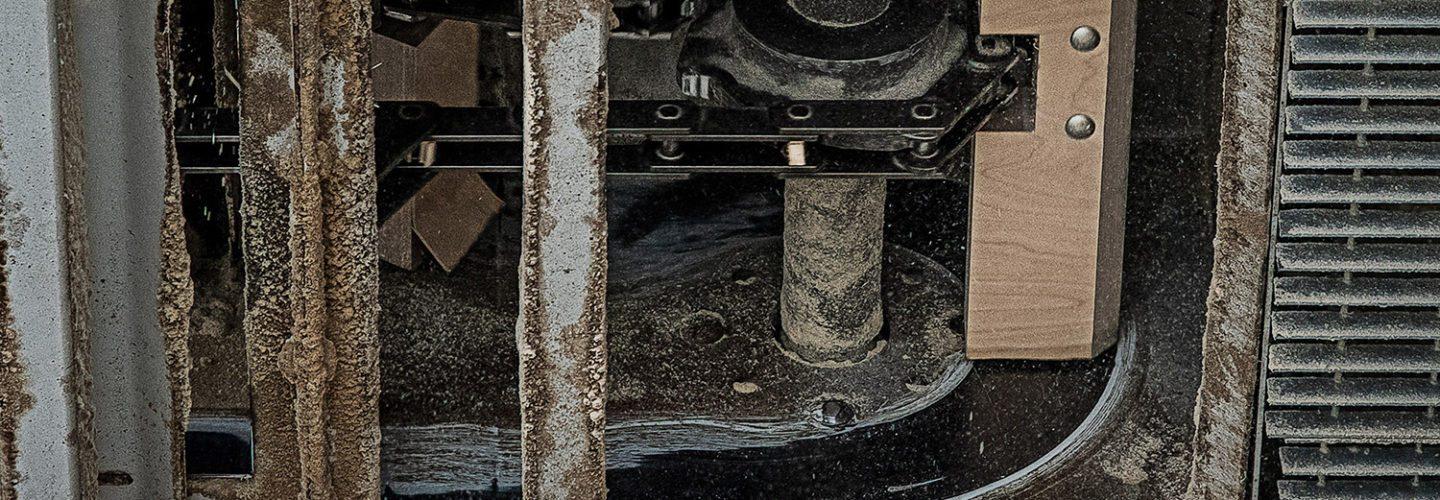
More environmentally friendly timber production, thanks to thin plywood scrapers
Koskisen’s sawmill in Järvelä is the first Finnish sawmill to test scrapers made of thin plywood in its chain conveyor for wood chips and sawdust. Chain conveyors at sawmills are usually noisy, but the noise levels can be influenced through the choice of scraper material. The goal for the Järvelä sawmill is to find a durable sawn timber production solution that generates less noise near residential areas. Experiences thus far are promising: Finnish thin plywood has proved a silent material that is competitive in cost when compared with, for example, beech.
Chain conveyor scrapers made of thin plywood are durable, silent, and environmentally friendly
The sawmill’s chain conveyor transports the sawdust and wood chips generated in the production processes from the lower saw to storage piles. ‘The scrapers were installed a few weeks ago, and we are monitoring noise levels. We expect thin plywood scrapers to be durable also,’ explains Koskisen’s Product Director Jaakko Huttunen.
With the new scrapers, Koskisen strives to address the increasingly strict environmental requirements, which include lower limits for noise levels. In addition, the beech scrapers currently in use at the sawmill are made of imported beech.
‘I think we are the first sawmill in Finland to test thin plywood scrapers. The initial experiences with regard to noise are promising. Thin plywood is extremely interesting also because it’s a Finnish-origin environmentally friendly material that has proved durable in production use,’ adds Huttunen.
Traces of thin plywood do not cause problems in pulp production
Sawn timber production generates numerous by-products, including sawdust and wood chips, which are used as raw material for pulp. The chips and sawdust are transported out of the sawmill along chain conveyors. A single chain conveyor typically has hundreds of scrapers, which must be replaced every couple of years.
‘As the by-products of sawn timber production are used as a raw material for pulp, we can’t use plastic scrapers. While plastic would offer a silent and durable alternative, its use is out of the question: plastic particles must not find their way into the raw material for pulp,’ says Huttunen.
Beech treated with hot oil has been tested as a material for chain conveyor scrapers. Steel is the traditional solution, but it causes too much noise. In addition, standard plywood, birch and beech treated with hot oil have been used for scrapers.
Durable thin plywood scrapers to sawmill | Koskisen
The benefits of thin plywood as a chain conveyor scraper material in comparison with plastic, metal, and beech:
Durable thin plywood scrapers to sawmill | Koskisen
- Plastic: If a plastic scraper comes loose, it enters the wood chips that will be used in pulp production. As plastic would ruin the pulp, it is almost never used as a material for scrapers.
- Metal: Metal is durable but noisy. Also, all metal must be removed from the wood chips, which increases costs.
- Beech: Beech is imported and is treated with oil.
- Thin plywood: Thin plywood offers a cost-efficient alternative. It is silent, extremely durable, and environmentally friendly Finnish material. It does not cause problems if it enters the wood chips.
Durable thin plywood scrapers to sawmill | Koskisen
Thin plywood comes into its own as a solution for industrial applications that require high durability
Durable thin plywood scrapers to sawmill | Koskisen
We would like to intensify our collaboration with industrial operators to find new applications for our durable thin plywood. Quite contrary to what its name suggests, thin plywood can be used to produce thick materials too. While most of the applications that thin plywood is used for require thin materials, it lends itself well to the production of thick materials also.